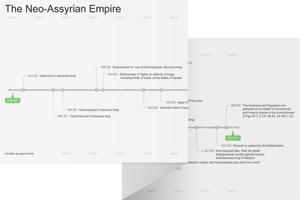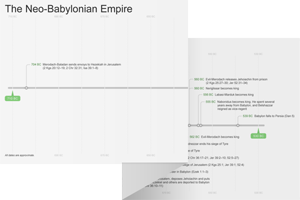14:1–2 Following the oracle of destruction against Babylon and the world at large in ch. 13, this short section reiterates God’s promises of restoration following His judgment. The chapter continues with poetic pronouncements of doom against Babylon, Assyria, and Philistia. Cosmic imagery is mixed in; the account in vv. 12–15 is often thought to describe Satan’s fall from heaven. |
14:1 their land Possession of the land was a key part of the covenant between God and Israel. If Israel was obedient, they would continue to possess the land. However, disobedience would lead to exile. See Deut 4:1, 28.
immigrant will join himself to them See Isa 2:2–4 and Zech 8:22–23. The ultimate restoration of Israel is accompanied by an acknowledgement from all the nations that Yahweh is the true God.
14:2 the house of Israel will take possession of them The restored house of Israel will take a preeminent place among the cultures of the world. This theme is expanded upon in Isa 45:14; 60:1–22; and 61:5–7.
the land of Yahweh Possession of the land is a central part of God’s promises to Israel. See note on v. 1.
over their oppressors A role reversal: the oppressors become subjects of those they oppressed.
14:3 gives you rest Compare 40:2, where God declares Israel has paid “double” for her sins.
hard labor The same phrase is used in Exod 1:14 to describe the Israelites’ slavery in Egypt. Israel’s restoration is envisioned in Isaiah as a second exodus. See Isa 11:15 and note; 11:16 and note.
14:4 this taunt The Hebrew word here denotes a proverb. It can also carry the sense of a mocking song, such as in Jer 24:9; Mic 2:4; and Hab 2:6, where the taunt is also directed at the Babylonians.
the king of Babylon Babylon is the future oppressor of Judah. The eventual fall of Jerusalem and the exile to Babylon is foreshadowed throughout the book of Isaiah; the envisioned restoration focuses on a return from exile. In Isaiah’s day, Babylon is subject to Assyria—the immediate threat for Israel. Judgment on Assyria was pronounced in Isa 10, but it will be revisited in vv. 24–27.
14:8 the cedars of Lebanon The region of Lebanon was famous for abundance and natural beauty, which centered on the highly prized cedars in great demand as building materials. In 2 Kgs 19:23, the king of Assyria is said to have boasted over his victory, cutting down the cedars and cypresses (or junipers) of the forest. This standard boast is inverted here, where the cedars boast that no one comes to cut them down. Yahweh’s judgment is directed against the prideful arrogance of human kings.
14:9 Sheol below is getting excited The underworld welcomes the now-fallen king.
welcomes the now-fallen king.
 Old Testament Theology of the Afterlife
Old Testament Theology of the Afterlife
dead spirits The Hebrew term repha'im (“shades”) refers to the dead in their shadowy existence in the afterlife (compare Psa 88:10). Former world leaders are welcoming the king of Babylon as an equal—he was once their overlord and oppressor, but he is now equally as powerless as they are.
(“shades”) refers to the dead in their shadowy existence in the afterlife (compare Psa 88:10). Former world leaders are welcoming the king of Babylon as an equal—he was once their overlord and oppressor, but he is now equally as powerless as they are.
 Old Testament Theology of the Afterlife
Old Testament Theology of the Afterlife
14:10 were made weak like us Rather than rising to meet the king of Babylon as a sign of honor, the foreign kings have come to mock him for his presumptuousness and arrogance.
14:11 maggots are spread out beneath you like a bed Imagery mixing the shadowy existence of the afterlife with the physical reality of decomposition.
14:12 morning star This Hebrew word referring to Venus as the morning star is translated into Latin as “Lucifer,” which later made its way into some English translations.
son of dawn The human king is mocked for his arrogance in believing himself to be like one of the gods. The Hebrew word shachar (“dawn”) is known from Canaanite mythology as the name of a deity. The same deity is likely alluded to in Job 38:7.
14:13 heart, ‘I will ascend to heaven The king of Babylon’s arrogance reflects the same pride as the people who built the tower of Babel (Gen 11:4).
above the stars of God This phrase describes heavenly beings (see Job 38:7–8 and note). In this verse it serves to identify the pride of both the king of Babylon and the original divine being whose story serves as the backdrop. This being, named in Isa 14:12, wanted to rule the divine council.
the mountain of assembly The meeting place of the divine council (compare Psa 82:1).
(compare Psa 82:1).
the summit of Zaphon Canaanite mythology depicted a northern mountain as the seat of the gods. The sacred mountain was called Zaphon—the same as the Hebrew word for north.
14:14 the Most High a title for the high god of the Canaanite pantheon; it is often used in the ot to refer to Yahweh. See Psa 82:6.
14:15 you are brought down to Sheol Instead of rising to the pinnacle of power as a god, he falls to the lowest level.
 Old Testament Theology of the Afterlife
Old Testament Theology of the Afterlife
14:16 who made the earth tremble In the end, the king is just a man whose time passes like all earthly rulers. No matter how powerful a king is during his reign, he will eventually die.
14:19 you are thrown away from your grave The king will not receive a royal burial or a proper burial at all. Instead, his body will be left on the field of battle and trampled.
14:21 take possession of the earth A similar concern is expressed in Gen 11:6 before God confounds the speech of those building the Tower of Babel.
14:22 I will rise up against them Compare Gen 11:7.
name and a remnant In contrast to God’s promise to preserve a remnant for Israel, no remnant will be preserved for Babylon.
14:23 a possession of the hedgehog A return to uninhabited wilderness. Compare Isa 13:20–22.
14:25 break Assyria in my land This pronouncement of judgment against Assyria is similar to that found in 10:12–19. Assyria turns back before conquering Jerusalem. Sennacherib, the Assyrian king, claims victory over many cities of Judah in his official annals, but gives no explanation as to why he turned and left Jerusalem mid-siege. See 37:36–38.
the Assyrian king, claims victory over many cities of Judah in his official annals, but gives no explanation as to why he turned and left Jerusalem mid-siege. See 37:36–38.
14:26 that is stretched out over all of the nations See 10:4. God’s hand is stretched out in judgment against Judah and Israel. Ultimately, the nations He uses to punish His people will also be judged.
14:28 In the year of the death of king Ahaz About 715 bc. Isaiah’s prophetic ministry covered parts of the reigns of four kings of Judah. See 1:1.
14:29 the rod that struck you is broken May refer to the Davidic dynasty that had asserted dominance over the Philistines. Ahaz had become a vassal of Assyria, and no longer a dominant power. The rod could also refer to Assyria (see 10:5, 24): Sargon II made Philistia into an Assyrian province in 711 bc. Perhaps the Philistines were overly confident because of the length of time between the revolt of Ashdod and the suppression by Sargon II (see 20:1).
a flying serpent The singular of the Hebrew term used to describe the heavenly beings in 6:2 (seraphim). See 30:6 and note.
14:30 it will kill your remnant Only Israel is promised a remnant. See v. 22.
14:31 from the north Invasion usually came from the north, as the empires of Mesopotamia moved south toward Egypt.
14:32 the needy of his people will take refuge The oracle against the Philistines ends with an assurance of protection from Zion. The oracle likely serves to reassure Israel of God’s promise to preserve a remnant of His people.

|
About Faithlife Study BibleFaithlife Study Bible (FSB) is your guide to the ancient world of the Old and New Testaments, with study notes and articles that draw from a wide range of academic research. FSB helps you learn how to think about interpretation methods and issues so that you can gain a deeper understanding of the text. |
| Copyright |
Copyright 2012 Logos Bible Software. |
| Support Info | fsb |
 Loading…
Loading…





